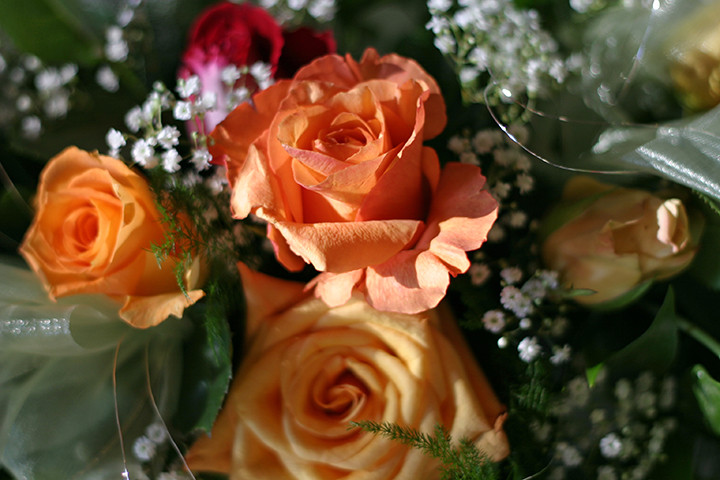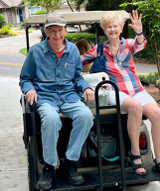Sometimes You Don’t Get Second Chances
A message about suicide by Nan Zastrow, Wausau, WI
This is an encore article. It was published in Grief Digest in 2005 shortly after the death of our son, Chad Zastrow, as a result of suicide. These were my initial thoughts about how I might accept suicide as a life event and live with this painful loss.
At one time, our family enjoyed playing the board game of LIFE. It was exciting to see what you could do with your life in a few short hours. The obstacles along the way were ones we laughed about: Taxes, Debts, Insurance.
The object of the game was to "win" and winning came from making all the right choices…those that would affect the outcome of LIFE. It was actually fun to see the challenges our fellow players encountered that might let us get ahead of them by just a few squares. We laughed at their poor choices and were there to judge those we thought chose wrong.
The game involved taking risks; and the risks were easy because the consequences weren't real. We might "win." Or we could go for broke and lose. And if this game of LIFE didn't work to our advantage, we could laugh about it and play it again the next time with new consequences.
We've put the game away now. This game like Monopoly, Big Business, and many others probably wasn't intended to teach us lessons. But when I think about it, I confess that the game taught me more than I realized.
Life is About Choices
Real LIFE is about choices that affect real outcomes. Sometimes we make good choices and sometimes we make bad choices. When we look back on the choice we made, we're not always sure why we did it. Maybe it was a "gut" feeling. Maybe we had illusions of grandeur. Maybe we were pressured by circumstances. Or maybe we just plain didn't give a darn at the moment.
I think about the power of choices when I think about my son's death by suicide. What was it that prompted that choice? I will never know for sure. And then again maybe it wasn't really a choice. Maybe it was a thoughtless millisecond in time that resulted in a fatal error. Sometimes we don't get second chances.
Chad died on April 16, 1993, without the benefit of a second chance. I knew that someday I would write this journal entry to share my pain and expose the subject that is socially taboo. And I've always known what my message would be. Suicide is an ugly word that conjures up images of a person who is emotionally, physically, spiritually or mentally disturbed. While I admit that this may be an underlying cause in many cases, I am now the first to say that I will never judge the victim's actions.
Survivors of suicide bear the pain of this stigma and are often judged as contributors to the outcome. They carry with them the lifelong pain of their loved one's choice. They live with questions that may never be answered. Their friends sometimes desert them at a time when friends are crucial to survival. Survivors feel the whispers, see the turned backs, and suffer the guilt of those "condemned." Do I really wear an "S" on a sign hanging around my neck? Maybe I do. But the "S" no longer stands for SUICIDE to curious inquirers. It stands instead for S-u-r-v-i-v-o-r.
How do we Measure our Heroes?
Who are we to determine right from wrong? People have taken their own lives since the beginning of recorded history. I don't believe that makes it right or wrong; but it does show how fickle we are. We change our attitudes to fit the circumstance. Here are a few examples of suicide that we have historically condoned:
History
Historically, suicides tallied great numbers in Japan when it was embedded in religious and national tradition.
Compulsory
Compulsory suicide was a form of punishment expected for offenders of noble birth. They could do penance for their crimes, "save face," and die by their own hands rather than by the sword of the public executioner. Voluntary hara-kiri was committed for revenge and for other reasons. Elaborate ceremonies preceded these rites. In World War II, Japanese kamikaze pilots volunteered to fly their munitions-loaded planes into enemy battleships. This was honorable. We saw this same happenings in Iraq. Heroic suicide is most prevalent in cultures that have strong group ties and loyalties to both country and religion.
Romance
We applaud stories of love and death, as long as they are stories. But how many times are similar "stories" acted out in modern life? Romeo and Juliet is a classic drama written over 400 years ago by William Shakespeare about two young lovers caught between family rivalries and forces beyond their control. Out of love for each other and the desire to be together forever, both Romeo and Juliet take their own lives.
Euthanasia
Today, we support freedom of choice when it suits our personal conviction or gain. Tremendous advances in medicine now make it possible to sustain life far beyond the time a person might ordinarily die. There are those who strongly desire active euthanasia sometimes called "the right to suicide." Euthanasia means "a good death." Passive euthanasia consists of withdrawing extraordinary life-prolonging techniques such as intravenous feeding and resuscitation or in not initiating such treatment when a situation appears hopeless. Active euthanasia consists of administering increasing doses of pain-relieving drugs such as morphine until it reaches a lethal level, or in injecting air into the patient's veins, thereby actively contributing to the person's death. How do we evaluate those choices? Whose right is it to evaluate these choices?
Religion and Clergy
And finally, as humans, we often ask our religious leaders to be the judge on the issue of suicide. Yet, religion has wavered hot and cold on the issue for decades. Perhaps it is a spiritual issue that can only be decided by the Highest Court. When Christianity reigned, suicide was very common in Greece and Rome. It was even encouraged. The early Christians apparently accepted the prevailing attitudes of their time, especially when persecution made life unbearable. Many early Christians submitted to Roman torture and allowed themselves to be killed as martyrs.
Today, religion and clergy have attempted to clarify their position on suicide. At the time our son died by suicide, some churches did not allow burial in the church. Ours did not discriminate. Today, as we understand more about suicide, that position has changing. Clergy view the question of suicide on the theological level and consider the roots in deep psychological problems and social issues.
As human beings, we attempt to make judgments. We give ourselves authority to determine right from wrong by the standards we've set. We measure people's lives by the choices they make. We consider right choices those that result in happy relationships, contentment, profound success, miraculous discoveries, wealth, fame and heroism. I question: “Who are we to judge?”
How to Play the "Game of Life"
Playing the real game of LIFE requires planting both feet firmly on the ground and moving them forward one step at a time. It requires focusing on goals both short-termed and long-termed. It requires making decisions with conscious thought. One must focus forward and never look back.
The real game of life means building new relationships all the time, those that are meaningful from the heart. Not just those that are self-serving. And the game of life means nurturing the spirit to be healthy, forgiving and loving based on a balance of body, mind and spirit. An investment in faith and in God reaps the greatest rewards.
The real game of life has ever-changing foundations and bumpy roads requiring us to rise up to meet each new challenge through self-awareness, continued learning and lasting memories. The real game of life is composed of risks, decisions and opportunities. To "win," we must be open-minded, less judgmental and less critical of others.
Never Accept a Situation at Face Value
Chad's death taught me never to accept a situation at face value. There are stories and emotions that run far deeper than we can imagine. Unless I've lived a person's pain, I cannot know their inner turmoil. While suicide harms lives other than the person who made the choice, the victim only sees his/her decision as one that may also alleviate another’s pain.
We, as a family, enjoyed the fruits of God's love. We had many beautiful years together that will always be cherished. We laughed and we cried together. We hugged, and we prayed. Chad believed in Jesus Christ and took him as his Savior. And I know, undoubtedly, that God welcomed him home.
I didn't have to forgive Chad because, in my eyes, he didn't do anything wrong. Only Chad knew the depth of his pain. Apparently, his pain was so great that there was no alternative. I accept that I could not alter his choice. And the mystery of his death, questions with no answers, has taught me empathy in all situations. Because I do not know why people make the choices they do, I value the real game of life.
Tallying the Score
When the Game of Life is over, it doesn't really matter how much money we made, how well-known we became, or how many "toys" we accumulated. The investment in intangible things is far greater than any other. These are other lessons I've learned from my son's death. While I don't condone suicide, I will not condemn those who made the choice whether willingly, planned or coerced to end their unbearable pain. I look twice at every situation now and wonder, "What would I have done if I walked in their shoes?" I honor the victim's pain. I respect their decision knowing that I will not judge. I tremble in the wake of the survivors who wear a cloak of shame knowing I wore one too. It is only now that I can cast my cloak aside and challenge those who silently judge me "to cast the first stone."
I am where I am in the Game of Life today, because I refuse to lose! I am humbled by the bumps in the road. I am weathered by the storms of change. I pray for strength and perseverance for all of my days. I pray that I may have choices and choose wisely.
I am spiritually lifted by small moments of triumph and God's small miracles every day. I play more seriously. I invest more wisely in relationships, people and moments. I depend upon prayer. I hold onto family values. I value friends. I savor each day knowing that life is short. This Game is one "for keeps." It's real! And sometimes you don't get second chances.
About the Author----------------
Nan Zastrow
In 2018,
Wings-a Grief Education Ministry will celebrate its 25th anniversary as a
non-profit organization. Wings was created as a ministry of hope by Nan
and Gary Zastrow after the death of their son, Chad Zastrow. On April
16, 1993, Chad died as a result of suicide. Nan is the author of five
books, a quarterly online grief eLetter and dozens of articles published
in various resources. Since 2003, Nan regularly publishes articles in Grief Digest Magazine. Visit the website at: www.wingsgrief.org or the Wings Facebook page.




